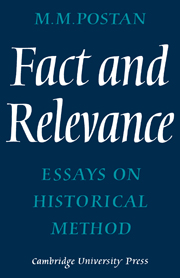Book contents
- Frontmatter
- Contents
- Acknowledgments
- Preface
- 1 Reason in social study
- 2 History and the social sciences
- 3 The historical method in social science
- 4 Function and dialectic in economic history
- 5 Fact and relevance in historical study
- 6 Economic and social history
- 7 Economic growth
- 8 A plague of economists?
- 9 The uses and abuses of economics
- 10 Agriculture and economic development: a lesson of history
- 11 Technological progress in post-war Europe
- 12 A study of history
- 13 Karl Marx: a democrat?
- 14 Hugh Gaitskell: political and intellectual progress
- Index
10 - Agriculture and economic development: a lesson of history
Published online by Cambridge University Press: 07 October 2011
- Frontmatter
- Contents
- Acknowledgments
- Preface
- 1 Reason in social study
- 2 History and the social sciences
- 3 The historical method in social science
- 4 Function and dialectic in economic history
- 5 Fact and relevance in historical study
- 6 Economic and social history
- 7 Economic growth
- 8 A plague of economists?
- 9 The uses and abuses of economics
- 10 Agriculture and economic development: a lesson of history
- 11 Technological progress in post-war Europe
- 12 A study of history
- 13 Karl Marx: a democrat?
- 14 Hugh Gaitskell: political and intellectual progress
- Index
Summary
The subject may strike some of you as highly suspect. In a gathering so purely historical and so largely academic, I propose to discuss what I frankly avow to be the lessons of history. An aversion to such lessons has now become the occupational allergy of academic historians. If, in spite of all my fidelity to academic standards and fear of historians, I have agreed to discourse on the present subject, I have done so because I believe that in this, as in so many other respects, we, the economic species of historians, are not like the other species. Most of our topics are problem-oriented. We choose them, not because they might help us to paint in a few economic facts into this or that historical picture but because they happen to be relevant to certain general problems. By definition, general problems are problems which occur in more than one historical situation, and of which the solutions are transferable from one historical situation to another.
In fact our work is riddled with such transfers. A subject we happen to study may on the face of it be limited to a date or a place, but it is almost invariably involved with other dates and other places. To cite an author whom I do not habitually cite with any approval, we often treat situations separate in time and space as philosophically or logically contemporaneous.
- Type
- Chapter
- Information
- Fact and RelevanceEssays on Historical Method, pp. 103 - 118Publisher: Cambridge University PressPrint publication year: 1971



